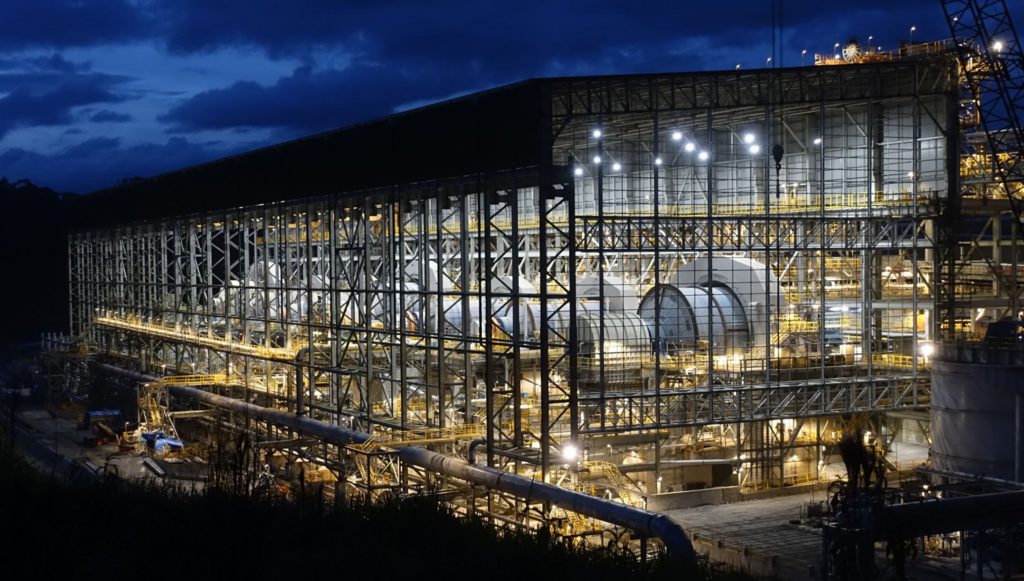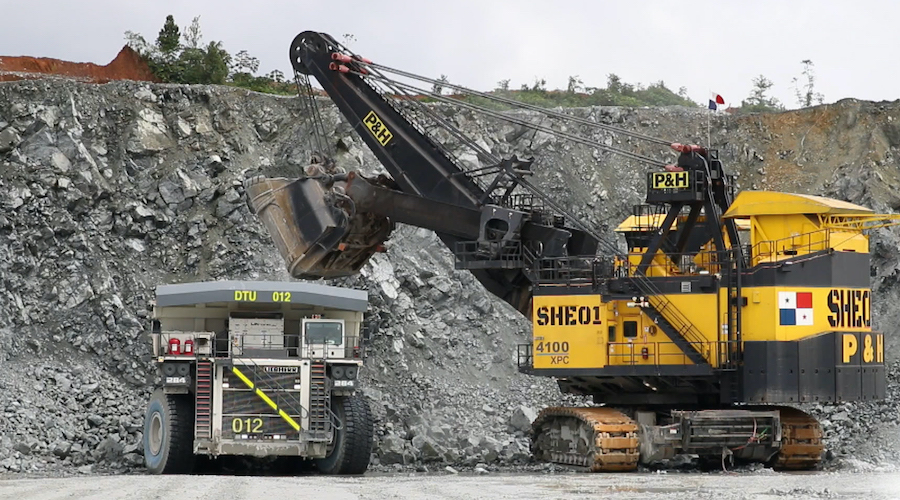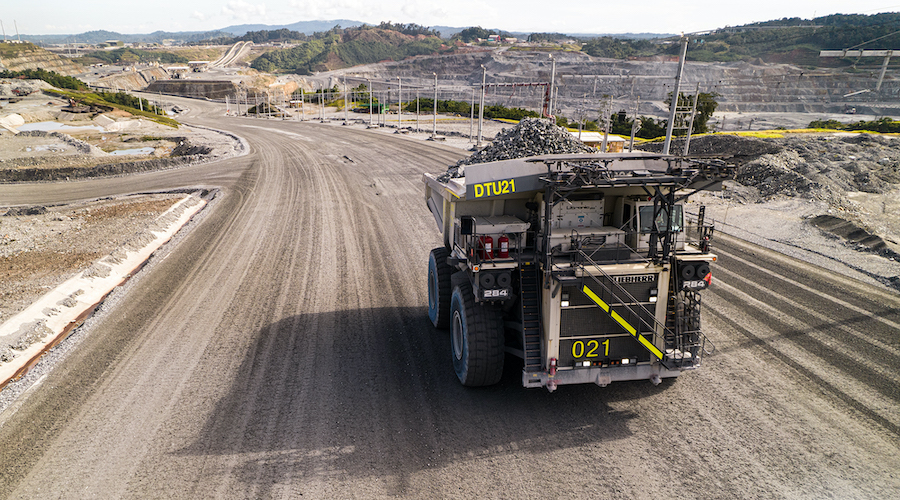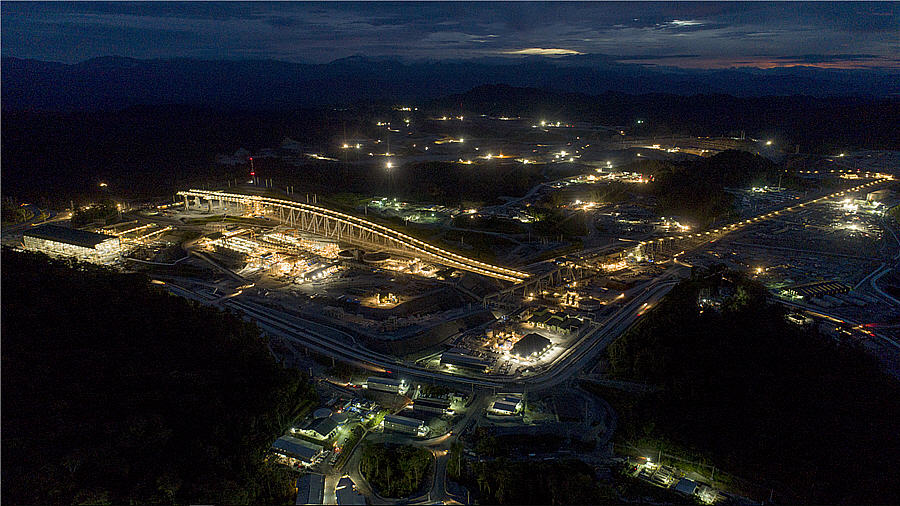Reuters | December 19, 2022 |

The mill at the Cobre Panama operation. Credit: First Quantum Minerals.
First Quantum Minerals must make a plan to halt work at its copper mine in Panama then go ahead with the scheme within two days of approval, the Central American country said after it and the Canadian company had failed to agree on boosting taxes from the project.

The company has 10 days to present the plan for the Cobre Panama mine, which the government has said accounts for 3.5% of gross domestic product, according to a resolution of the Commerce and Industry Ministry published in Panama’s official gazette.
First Quantum can appeal against the ministry’s order within five days, however.
A spokesperson for First Quantum did not immediately respond to a request for comment about the ministry’s order.
Panamanian authorities reached the decision after both parties missed a deadline last week to finalize a deal that would have increased annual payments to the government to at least $375 million.
First Quantum says the mine is the largest private investment in Panama.
(By Valentine Hilaire; Editing by David Alire Garcia and Bradley Perrett)
Transparency International denounces lack of clarity in Cobre Panamá’s negotiations
Valentina Ruiz Leotaud | December 18, 2022 |

Cobre Panamá operation. (Image by First Quantum Minerals).
The Panamanian chapter of Transparency International (TI) issued a communiqué denouncing what the organization deems as a lack of clarity in the negotiations between the government of President Laurentino Cortizo and Minera Panamá, the local subsidiary of First Quantum Minerals (TSX: FM).

Back on Friday, the Panamanian government ordered the Canadian miner to halt operations at its Cobre Panamá copper mine after it failed to agree on the terms of a new contract.
The move came after First Quantum missed a Wednesday night deadline to ink a new royalty deal that has been in the works since September 2021.
“The case of Minera Panamá is a clear example of the lack of transparency displayed by several administrations, including the current one,” TI’s media statement reads.
“Since the Executive announced, back in January 2022, that it had reached an agreement with the company, guaranteeing a minimum payment of $375 million per year and an increase in royalties, little to no information had been disclosed until yesterday when the suspension measures of Minera Panamá’s commercial activities were announced.”
In the view of the NGO, the lack of open information hinders the ability of the Panamanian population to assess whether the government is defending people’s best interests or whether there are conflicts of interest or undue influences at play in the negotiations.
The brief compares the dealings with Minera Panamá to those related to the renewal of a contract with Panamá Ports a year ago. According to TI, such negotiations were done in a shady way and resulted in the government accepting insufficient remuneration for the use of the Panama Canal and allowing a company to monopolize it for the next 25 years.
“The legal obligation of being transparent and allowing access to public information has regressed alarmingly in this administration, both being replaced by unprecedented silence, illegal refusals, and impunity,” the communiqué reads.
“Democracy, which these days is threatened in many parts of the world, requires citizens to actively and permanently defend it, demanding accountability from institutions, officials and politicians.
Valentina Ruiz Leotaud | December 18, 2022 |

Cobre Panamá operation. (Image by First Quantum Minerals).
The Panamanian chapter of Transparency International (TI) issued a communiqué denouncing what the organization deems as a lack of clarity in the negotiations between the government of President Laurentino Cortizo and Minera Panamá, the local subsidiary of First Quantum Minerals (TSX: FM).

Back on Friday, the Panamanian government ordered the Canadian miner to halt operations at its Cobre Panamá copper mine after it failed to agree on the terms of a new contract.
The move came after First Quantum missed a Wednesday night deadline to ink a new royalty deal that has been in the works since September 2021.
“The case of Minera Panamá is a clear example of the lack of transparency displayed by several administrations, including the current one,” TI’s media statement reads.
“Since the Executive announced, back in January 2022, that it had reached an agreement with the company, guaranteeing a minimum payment of $375 million per year and an increase in royalties, little to no information had been disclosed until yesterday when the suspension measures of Minera Panamá’s commercial activities were announced.”
In the view of the NGO, the lack of open information hinders the ability of the Panamanian population to assess whether the government is defending people’s best interests or whether there are conflicts of interest or undue influences at play in the negotiations.
The brief compares the dealings with Minera Panamá to those related to the renewal of a contract with Panamá Ports a year ago. According to TI, such negotiations were done in a shady way and resulted in the government accepting insufficient remuneration for the use of the Panama Canal and allowing a company to monopolize it for the next 25 years.
“The legal obligation of being transparent and allowing access to public information has regressed alarmingly in this administration, both being replaced by unprecedented silence, illegal refusals, and impunity,” the communiqué reads.
“Democracy, which these days is threatened in many parts of the world, requires citizens to actively and permanently defend it, demanding accountability from institutions, officials and politicians.
Panama leaves door open to eleventh-hour deal for giant mine
Bloomberg News | December 17, 2022 |

Cobre Panamá mine. (Image by First Quantum Minerals).
A shock announcement by Panama to intervene in a privately run copper mine may not be as definitive as first thought.

First Quantum Minerals Ltd. continues to mine the massive Cobre Panama open-pit despite a government order to close commercial operations after talks for a new tax arrangement collapsed, people with knowledge of the situation said.
In addition, the administration of President Laurentino Cortizo hasn’t closed the door to a resumption of talks, they said, asking not to be named discussing private information.
That’s a less black and white picture than earlier in the week when Cortizo declared negotiations over and instructed the Commerce Ministry to put the mine on care and maintenance. The government was also said to be seeking another operator to replace Vancouver-based First Quantum.
The wiggle room appears to be in the fact that halting the mine requires a resolution to rescind contracts, potentially giving the two sides a window of time to reach a deal.
The collapse in talks caught investors by surprise given how much is at stake for both sides if the operation is seized.
The mine, which cost at least $10 billion to build, is by far First Quantum’s biggest asset as well as an economic engine for the country. Ripping up contracts would be a hammer blow to the company and to Panama’s investor-friendly reputation, as well as potentially setting off a massive legal case.
Earlier Friday, the company signaled it hadn’t given up hope after coming “very close to an agreement” before the government pulled the plug. On the same day, Cortizo said that while everything had been suspended, “we can’t discard anything for obvious reasons.”
(By James Attwood and Yvonne Yue Li, with assistance from Michael McDonald)
Bloomberg News | December 17, 2022 |

Cobre Panamá mine. (Image by First Quantum Minerals).
A shock announcement by Panama to intervene in a privately run copper mine may not be as definitive as first thought.

First Quantum Minerals Ltd. continues to mine the massive Cobre Panama open-pit despite a government order to close commercial operations after talks for a new tax arrangement collapsed, people with knowledge of the situation said.
In addition, the administration of President Laurentino Cortizo hasn’t closed the door to a resumption of talks, they said, asking not to be named discussing private information.
That’s a less black and white picture than earlier in the week when Cortizo declared negotiations over and instructed the Commerce Ministry to put the mine on care and maintenance. The government was also said to be seeking another operator to replace Vancouver-based First Quantum.
The wiggle room appears to be in the fact that halting the mine requires a resolution to rescind contracts, potentially giving the two sides a window of time to reach a deal.
The collapse in talks caught investors by surprise given how much is at stake for both sides if the operation is seized.
The mine, which cost at least $10 billion to build, is by far First Quantum’s biggest asset as well as an economic engine for the country. Ripping up contracts would be a hammer blow to the company and to Panama’s investor-friendly reputation, as well as potentially setting off a massive legal case.
Earlier Friday, the company signaled it hadn’t given up hope after coming “very close to an agreement” before the government pulled the plug. On the same day, Cortizo said that while everything had been suspended, “we can’t discard anything for obvious reasons.”
(By James Attwood and Yvonne Yue Li, with assistance from Michael McDonald)
Shutting huge copper project shows why miners worry about starting them
Bloomberg News | December 16, 2022

Cobre Panama mine at night. Image by First Quantum Minerals.
Panama’s decision to close a giant copper mine couldn’t come at a worse time for the market, and highlights the risk of investing big in some projects.

Just when the world faces a looming shortage of copper — a metal essential for the green revolution — Panama on Thursday said it will halt commercial operations at the Cobre Panamá operated by Canada’s First Quantum Minerals Ltd. It followed the breakdown of tax talks and is a rare move among Latin American countries.

The mine, which is one of the world’s newest and can produce about 300,000 tons a year of copper, cost at least $10 billion to build.
The industry has long feared resource nationalism, where assets can be stripped from them in extreme cases. Investing can be a huge risk when billions of dollars must often be spent up to a decade before a mine turns a profit. The fear of losing assets or having to renegotiate terms with governments has led the sector to shy away from what are often perceived as the riskiest jurisdictions.
For example, mining heavyweight BHP Group for years only invested in what it saw as safe countries, while rich deposits remained undeveloped in the riskiest places.
In the short term, halting output at Cobre Panama will add to already tight supplies. In recent weeks both Glencore Plc and Anglo American Plc have lowered copper production goals for the coming years. But the impact on companies’ willingness to build more mines could be more significant, according to BMO Capital Markets.
“Perhaps more important however is the precedent this might set for government action, which would naturally make companies more cautious to invest (particularly in non-mining jurisdictions),” BMO analyst Colin Hamilton said.
Warnings that the world needs more copper keep coming. Glencore Chief Executive Officer Gary Nagle earlier this month said there’s a cumulative gap between projected demand and supply of 50 million tons between 2022 and 2030. That compares with current world copper demand of about 25 million tons a year.
Copper miners and analysts have forecast growing deficits starting in the mid-2020s, driven by rising demand for the metal in wind and solar farms, high voltage cables and electric vehicles.
(By Thomas Biesheuvel)
Bloomberg News | December 16, 2022

Cobre Panama mine at night. Image by First Quantum Minerals.
Panama’s decision to close a giant copper mine couldn’t come at a worse time for the market, and highlights the risk of investing big in some projects.

Just when the world faces a looming shortage of copper — a metal essential for the green revolution — Panama on Thursday said it will halt commercial operations at the Cobre Panamá operated by Canada’s First Quantum Minerals Ltd. It followed the breakdown of tax talks and is a rare move among Latin American countries.

The mine, which is one of the world’s newest and can produce about 300,000 tons a year of copper, cost at least $10 billion to build.
The industry has long feared resource nationalism, where assets can be stripped from them in extreme cases. Investing can be a huge risk when billions of dollars must often be spent up to a decade before a mine turns a profit. The fear of losing assets or having to renegotiate terms with governments has led the sector to shy away from what are often perceived as the riskiest jurisdictions.
For example, mining heavyweight BHP Group for years only invested in what it saw as safe countries, while rich deposits remained undeveloped in the riskiest places.
In the short term, halting output at Cobre Panama will add to already tight supplies. In recent weeks both Glencore Plc and Anglo American Plc have lowered copper production goals for the coming years. But the impact on companies’ willingness to build more mines could be more significant, according to BMO Capital Markets.
“Perhaps more important however is the precedent this might set for government action, which would naturally make companies more cautious to invest (particularly in non-mining jurisdictions),” BMO analyst Colin Hamilton said.
Warnings that the world needs more copper keep coming. Glencore Chief Executive Officer Gary Nagle earlier this month said there’s a cumulative gap between projected demand and supply of 50 million tons between 2022 and 2030. That compares with current world copper demand of about 25 million tons a year.
Copper miners and analysts have forecast growing deficits starting in the mid-2020s, driven by rising demand for the metal in wind and solar farms, high voltage cables and electric vehicles.
(By Thomas Biesheuvel)
No comments:
Post a Comment